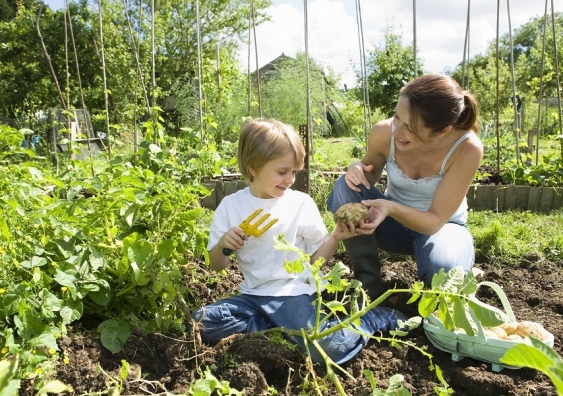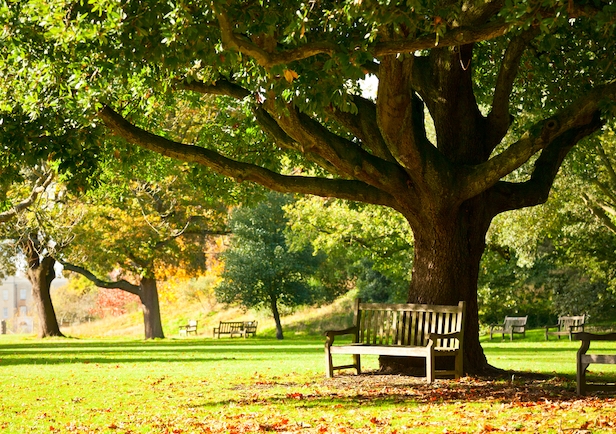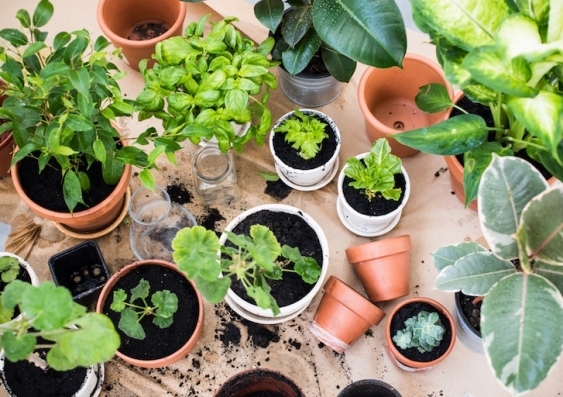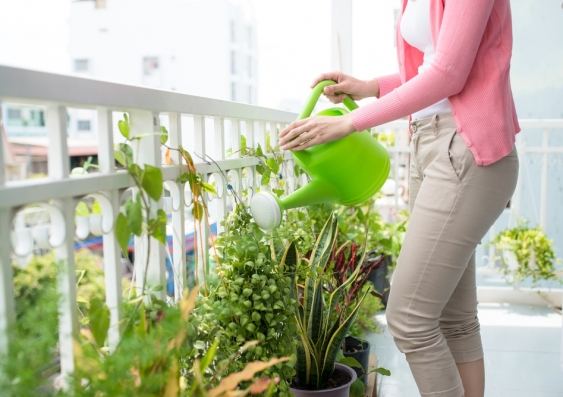Greening our way through the pandemic

Taking the time to care for plants, potter in the garden or visit your local park could help to relieve some of the stress of the COVID-19 pandemic, UNSW Sydney experts say.
Plant ecologist Professor Angela Moles, Director of the Evolution and Ecology Research Centre, has experienced the benefits of gardening both at home and in the community.
When she’s not researching global patterns in plant growth and herbivory (the act of animals eating plants), Prof Moles volunteers on campus for the UNSW Urban Growers program or improves the green spaces in her neighbourhood.
“My garden at home attracts the local wildlife, so when rainbow lorikeets come to visit for the nectar from the native flowers our kids love going outside to watch them – just one of the many benefits of having a good garden,” she said.
“I also spruced up a shared patch of grass in my community with lots of plants – my neighbours stopped to talk to me, shared gardening tips and said: ‘Wow, well done, that looks so much better.’
“I’ve found that getting involved with a gardening project is a wonderful thing.”
Green spaces benefit the community
Associate Professor Xiaoqi Feng, an expert in Urban Health and Environment, agreed that plants brought positivity to people’s lives.
A/Prof Feng engages with communities and analyses data to better understand how green spaces improve people’s health and wellbeing.
“I’ve done a series of landmark studies with leading scientists on how green space quality and type influence health outcomes across childhood, adolescence and adulthood,” she said.
“Anecdotal evidence from people I have met supports what I have found in studies with thousands (and in some cases, hundreds of thousands) of participants: that living near green space may have remarkably wide-ranging health benefits.
“Green space means anything from a solitary tree through to sports ovals, botanic gardens, nature reserves and national parks.”

One of A/Prof Feng’s studies showed that 12 to 13-year-olds living in suburbs with more than 40 per cent green space had 14 per cent fewer symptoms of depression and anxiety, compared with those in suburbs with less than 20 per cent of landcover comprising green space.
“I found the potential benefits of green space quantity are relatively consistent across childhood, whereas those benefits from quality green space appear to grow as children reach adolescence,” she said.
“This likely reflects good quality green spaces being perceived as safe and cognitively and physically stimulating settings, where parents feel comfortable to let their adolescents play outdoors (and where many adolescents may prefer to play) with friends without their supervision.”
A/Prof Feng said green space was also a mood booster for adults, including young mothers.
“I found that recent mothers with good quality green space nearby have 26 per cent lower odds of reporting psychological distress, compared to mothers who do not have good quality green space nearby,” she said.
“I also discovered that adults over 45 years with 30 per cent tree canopy cover, specifically within 1.6km of their home, had 31 per cent lower odds of incident psychological distress over six years, compared to peers with less than 10 per cent tree canopy cover.
“Trees, it seems, may be playing a vital role in supporting our mental health, and this is likely due to various reasons like providing shade and cleaning the air, smoothing out the grey right angles in cities, and bringing us all closer to wildlife.”

Planting therapeutic values
Philippa Specker, a PhD and Master of Psychology candidate, is trained in clinical psychology.
She has worked with patients who used plants, gardening and green spaces in creative ways to help cope with stress and elevate their mood.
“One patient had a peace lily on their work desk that they looked at to help them remain calm when they were on the telephone with difficult customers. Another patient decorated their bedroom with indoor climbing vines to help bring them joy at home,” Ms Specker said.
“And a different patient used gardening as a way to ensure they got regular exercise and fresh air. They also found that gardening helped them feel accomplished and it was a fun social activity they could do with their grandchildren.”
Ms Specker said caring for plants was a good mood booster in several ways.
“First, it’s an example of behavioural activation – which is a key part of Cognitive Behavioural Therapy (CBT) for people with low mood, and the reverse cycle of depression. When we experience low mood, we tend to do fewer activities, which in turn further lowers our mood,” she said.
“Behavioural activation is where we engage in activities that give us pleasure or a sense of achievement in order to stabilise our mood.
“Second, taking the time to care for plants can be used as a self-soothing or distraction technique to help us cope with negative emotions like fear, sadness and anger.
“Finally, particularly as many of us are now housebound, incorporating gardening into your routine may help to reduce boredom.”

Garden for fun, not survival
In response to media reports that the pandemic had caused people to panic buy vegetable seeds and seedlings for fear of running out of food, despite being told it was the wrong season to grow them, Prof Moles said gardening should be about enjoyment.
“Growing your own vegies is a nice hobby and will improve your backyard, but no one can expect to feed their family a few weeks after popping outside with a shovel and planting a packet of seeds,” she said.
“Establishing an edible garden is a long-term project – but well worth the effort if you want to give it a go.”
Ms Specker said it was understandable that empty supermarket shelves had caused people to panic and even prompted some to try growing their own produce – but gardening out of fear was unlikely to be therapeutic.
“For people looking to garden or collect plants during the pandemic, viewing it as a self-care activity – rather than as a substitute for grocery shopping – may be more helpful,” she said.
“If we can remove that pressure from the activity, then we are creating opportunities to experience joy and accomplishment, which in turn, can help us relax and elevate our mood.”
Start greening now
Despite many people still spending most of their time at home because of COVID-19, Prof Moles said there were plenty of options to start greening your surrounds without leaving your neighbourhood.
“If you live in a strata community, check the regulations to see what you can put on your balcony, and research what plants will suit your conditions indoors and out,” she said.
“Many garden centres offer delivery and so do online nurseries, so there’s no need to leave home.”
Ms Specker said if people wanted more information about how to support their mental health during these challenging times, they could visit “This Way Up” online.
The website offers free evidence-based online courses, resources and frequently asked questions developed specifically for the COVID-19 pandemic.
This article was produced by Caroline Tang for the UNSW Newsroom, view the original article here.



